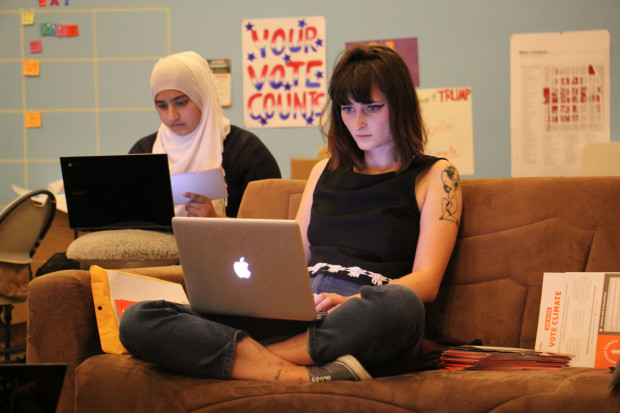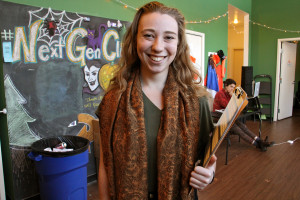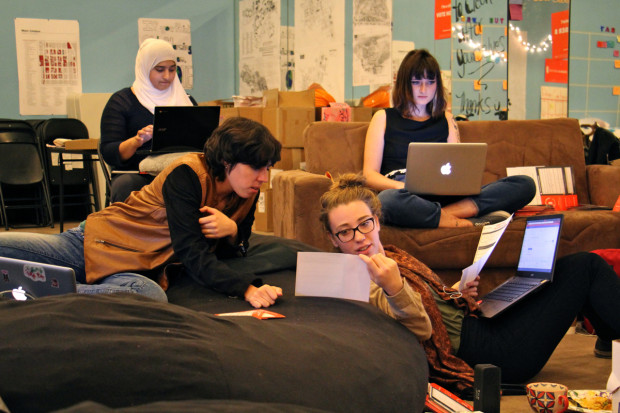Climate Super PAC pursues Pennsylvania’s college vote in presidential campaign
-
Susan Phillips -
Jon Hurdle

Emma Lee / WHYY
NextGen field organizer Ann Drabick (right) and Temple student Rabia Kashmiri using social media to get out the millennial vote.
Climate activists are pushing hard to register millennials to vote in the hope that they will support Hillary Clinton, especially in Pennsylvania, a swing state that could play an important role in the outcome of the presidential election.
NextGen Climate, a Super PAC founded by hedge fund billionaire Tom Steyer, is spending $25 million in 13 states to build support for Clinton and down-ballot candidates among 18-35 year-olds, especially on college campuses. NextGen has spent about $737,875 on the Pennsylvania Senate race, according to the Center for Responsive Politics.
The group’s biggest operation is in Pennsylvania, where it says it registered almost 80,000 millennial voters from May until the registration deadline on Oct. 11. The group works on 87 college campuses across the state, and reaches out to older millennials who are no longer college students but are also expected to support candidates who will work to curb greenhouse gas emissions.
The betting is that young voters who want to see national energy policy that moves away from fossil fuels and towards renewables will vote for Clinton, said Patrick Millham, the group’s Pennsylvania director.
“If they turn out to the polls, they will support progressive causes that we are fighting for,” Millham said. He said NextGen polling has found 83 percent of millennials support clean-energy policies.
NextGen’s claim to have registered some 80,000 millennial voters since May could not be verified by Pennsylvania Department of State officials. Kaitlin Murphy, deputy press secretary, said 2.24 million 18-34 year-olds are registered to vote in the Nov. 8 election; about a quarter of them registered on line.

Emma Lee / WHYY
NextGen field organizer Kim Selig, 21, took a semester off during her senior year at Temple in order to focus all her energy on the November election.
Millham’s group, based near the campus of Temple University in Philadelphia, and with offices in Scranton, State College and Pittsburgh, sends volunteers out to colleges with clipboards and paper forms that record students’ names, addresses, emails, and most importantly, the phone numbers where they can be reached in follow-up texts.
In filling out the form, respondents’ seriousness about voting is gauged by asking them at what time of day they plan to vote; how they will get to their polling place, and whether they will go alone or with friends and family.
On a fold-out card, young voters are given a comparison of the positions on climate and other policies by Clinton and her Republican opponent Donald Trump, as well as by Katie McGinty, Pennsylvania’s Democratic candidate for U.S. Senate, and her opponent, Sen. Pat Toomey, who is seeking re-election for the GOP.
NextGen’s summaries of the candidates’ policies are humorous, partisan, and borderline profane. On whether a candidate supports the idea of creating a 100 percent clean energy economy, the guide summarizes Clinton’s position as “Let’s protect the climate”, while it says Trump’s policy is expressed as “No, I luv pure beautiful oil.”
On whether to keep the U.S. Environmental Protection Agency, Clinton’s position is rendered as “WTF, of course” while Trump’s stance is said to be “GTFO government.”
Toomey’s position on whether to limit carbon pollution from power plants is expressed as “Coal is king”, while McGinty’s stance is rendered as simply “Um, duh”.
After registering a voter with state election authorities, NextGen Climate’s teams of volunteers follow up with individual texts designed to maintain communication, remind each person to vote, and invite them to volunteer for a Get Out The Vote operation on election day.

Emma Lee / WHYY
Temple student Jamie Schoshinski consults field organizer Kim Selig at NextGen’s Pennsylvania headquarters in North Philadelphia.
Texting is by far the most likely way to register millennial voters, said Kim Selig who is taking a semester off as a marketing major at Temple University to lead volunteers as a paid field organizer for NextGen Climate.
“It’s a way to keep in touch and make sure that they still know where their polling places are, and to create a voting plan,” Selig said, in an interview in the group’s Philadelphia office. “We also do phone banking but texting gets a much higher response. Because we are able to communicate with so many people using these tools, we are able to find people who are super-energized and really want to do more about it.”
Asked to explain the explicitly partisan nature of the group’s voter-registration drive, Selig argued that pro-climate policies are indivisible from an anti-Trump vote.
“Stopping Trump is a very important thing in making sure that we get proper environmental policy,” Selig said. “It connects so many issues, it’s an all-encompassing thing.”
Selig, 21, said she works 14 hours a day, seven days a week for NextGen and has been doing so since June. Like some other NextGen campaigners, she previously worked as a “really heavy” volunteer for the presidential campaign of Sen. Bernie Sanders, and said it wasn’t easy to switch her allegiances to Clinton. But like many young voters she’s helping motivate, she opposes Trump for several different reasons. She’s also bolstered by the fact that Sanders supporters like herself helped push Hillary Clinton farther to the left on issues like climate.
“This actually used to be the old Bernie office, so I have never left,” she said. “It’s nice to realize that that same fight we were fighting for is still going on.”
The office, filled with bicycles, cereal boxes and tables full of clip boards, has been customized for the climate campaign with hand-written signs like “Coal is So Last Century”, “Stop the Dakota Access Pipeline” and the nakedly partisan “Trump is Junk.”
G. Terry Madonna, Director of the Center for Politics and Public Affairs at Franklin and Marshall College in Lancaster, PA, said he was unaware of any polling data on millennials’ support for climate policies in the current campaign but argued that many of them are committed to policy that pursues a low-carbon future. “It’s a big issue for them,” he said.
During a reporter’s visit to the NextGen campaign office in Philadelphia last Friday, about a dozen volunteers sat on bean bags and sofas, texting their peers around the state via laptops. Officials declined to disclose an actual text, citing privacy concerns.
Jamie Schoshinski, 21, a senior in political science and English at Temple, said she was volunteering while still going to school full-time because she wants to make energy and climate a more prominent part of the national debate.
“Climate is not the issue that’s talked about a lot in the media; it’s not the issue that’s brought up a lot in the debates,” she said. “I just like trying to get people to think that this is a really important issue, and we don’t have time to waste, and we need to act now, and it’s not something that we can just keep putting off.”
















